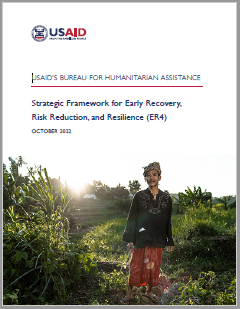
USAID's Bureau for Humanitarian Assistance (BHA) has developed this strategic framework to provide guidance to BHA and Agency staff and partners on approaches and programming in the areas of early recovery, risk reduction, and resilience (ER4). Over the past decade, humanitarian assistance has evolved and adapted to a changing humanitarian landscape, characterized by climate change, complex and protracted crises, global migration, urbanization, and the rise of infectious disease outbreaks and global pandemics. Humanitarian assistance has thus extended beyond disaster response and traditional disaster risk reduction (DRR) activities to include a diverse set of activities characterized by innovative disaster risk management approaches.
The goal of BHA's ER4 efforts is to improve the well-being of vulnerable people—from the individual to country level—by strengthening their capacities to manage risk; to anticipate, withstand, recover from, and adapt to shocks and stresses; and to support positive, transformative change. BHA is committed to integrating ER4 programming into our responses wherever and whenever appropriate and to ensuring strong linkages with humanitarian and development actors on local, national, and global scale. Our efforts in this space reflect USAID’s core mission, ultimately promoting resilience and enabling people to take ownership of their own humanitarian and development outcomes.

